Bibliographical Note
This Dover edition, first published in 2003, is an unabridged republication of the work originally published under the title Sir William Wallace by Charles Scribners Sons, New York (1898) and Oliphant, Anderson & Ferrier in 1898 as part of the Famous Scots series.
Library of Congress Cataloging-in-Publication Data
Murison, Alexander Falconer, 18471934.
[Sir William Wallace]
William Wallace : guardian of Scotland / A.F Murison.
p. cm.
Originally published: Edinburgh : Oliphant, Anderson & Ferrier, 1898, in series: Famous Scots series.
9780486143415
1. Wallace, William, Sir, d. 1305. 2. ScotlandHistoryWallaces Rising, 12971304. 3. RevolutionariesScotlandBiography. 4. NationalistsScotlandBiography. 5. GuerrillasScotlandBiography. I. Title.
DA783.3.M9 2003
941.102092dc21
[B]
2003046294
Manufactured in the United States of America
Dover Publications, Inc., 31 East 2nd Street, Mineola, N.Y. 11501
43182702
TO
THE MEMORY OF
THE COMRADES AND HELPERS
OF
SIR WILLIAM WALLACE
MEN OR WOMEN
DISTINGUISHED OBSCURE OR NAMELESS
Quod de re publica non desperassent
My son, I tell thee soothfastlie,
No gift is like to LIBERTIE;
Then never live in slaverie.
For FREEDOMS battle, once begun,
Bequeathd by bleeding Sire to Son,
Though baffled oft, is ever won.
PREFACE
THE ignorance of some otherwise well-informed persons respecting the claims of Wallace as a national patriot, wrote Dr. Charles Rogers, is deplorable.
The documentary authorities are, indeed, fragmentary, and exceptionally perplexing. Some are clearly trustworthy ; many are conflicting, dissimulatory, falsified, false, biassed in all degrees, and full of inference and hearsay set forth in the guise of indubitable fact. The researches of English historianseven when they happen to be Scotsmenhave not yet rendered further investigation superfluous.
The fact is, that a large critical undertaking must form the basis of any adequate account of Wallace. In a brief narrative the writer must resign himself to the simple if somewhat perilous course of telling his story as it has shaped itself in his mind during perusal of the available authorities, with but occasional and slight indications of the shaping process.
The noble poem of Blind Harry, thanks largely to the ingenium perfervidum of the minstrel himself, has been muchwe may say whollydiscredited as history. Harry has been very cavalierly dealt with, however; it is more by a grin than otherwise that he has been vanquished. Stevensons tentative protest is here emphasised. For the present sketch, however, Harry is used rather by way of illustration than as a source of facts. He is cited without any claim to credence, except on grounds definitely specified. But such reservation is provisional, and conditioned by such rational criticism as may one day yet be applied. The citations in the text have been conservatively modernised. All students of Harrys poem owe their most grateful acknowledgments to Dr. James Moir and the Scottish Text Society.
One is reluctant to believe that there are no more references to Wallace still lying dormant in the muniment rooms of Scottish families. One is no less reluctant to suppose that any patriotic Scot would leave a solitary corner of his muniments unsearched for every possible glint of light upon the great man that has stood forth for six centuries, and will in all probability stand forth for ever, as incomparably the most heroic and most fateful figure in the history of Scotlanda Hero and a Patriot second to none in the recorded history of the nations.
CHAPTER I
THE ENGLISH AGGRESSION
Quhen Alysandyr oure Kyng wes dede,
That Scotland led in lu

e and l,
Away wes sons of ale and brede,
Off wyne and wax, off gamyn and gl:
Oure gold wes changyd in to lede.
Cryst, borne in to Vyrgynyt,
Succoure Scotland and remede,
That stad [is in] perplexyt.
WYNTOUN, VII. fin .
A MOST fateful date in the history of Scotland was the 19th of March 128586. In the dusk of that memorable day, King Alexander III., riding along the coast of Fife, near Kinghorn, was thrown over a precipice and killed. He was only in the forty-fifth year of his age, though in the thirty-seventh year of his reign. If we take our stand at Kinghorn on the next melancholy morning, and gaze backwards and forwards on the history of the country, we shall witness the most impressive contrast of peace and war that is presented in the annals of Scotland, or perhaps of any civilised nation in the world. This awful contrast forms a most essential element in determining the judgment of history on the policy of the Scots and of the English kings. At the death of Alexander, Scotland was a most prosperous country, steadily advancing in the arts of peaceful lifemore civilised and more prosperous, says Innes, with the common assent of historians, than at any period of her existence, down to the time when she ceased to be a separate kingdom in 1707. The policy of Edward I., however motived, was the prime cause of this lamentable subversion of the tranquillity of a hundred years.
THE PROJECT OF MARRIAGE
The shadows of coming trouble had fallen upon Scotland before the death of Alexander III. The family of the King had been swept away by death. His first queen, Margaret, eldest daughter of Henry III. and sister of Edward I. of England, had died in 1275. His younger son, David, had died in 1280. His elder son, Alexander, who married Margaret, daughter of Guy, Count of Flanders, in 1282, had died without issue early in 128384. His only daughter, who married Eric II., King of Norway, in 1281, had also died early in 128384, leaving a daughter. Alexander was little over forty. Still there is no assurance of length of days; and if he should die there would be a minority, probably a disputed succession, possibly an active revival of the English claim to over-lordship. In these circumstances, Alexander at once proceeded to take such precautions as he could. He summoned a Parliament at Scone on February 5, 128384, and obtained from his nobles their solemn acknowledgment of Margaret, Princess of Norway, as heiress of Scotland, failing issue of himself and of his late son. Towards the end of next year, he also married a second wife, Joleta (or Iolande), daughter of the Count de Dreux ; but she bore him no child. Alexander must have often and anxiously reflected upon the likelihood of a recurrence of such baronial rivalries as had proved a grave danger to the country during his own minority. On his tragic death on March 19, 128586, the hopes of the nation were left to rest upon the fragile Maid of Norway.
For a short period the affairs of the kingdom maintained a placid course. On April 11, 1286, the magnates assembled at Scone, and selected six of their number to act as a Council of Regency, with the official designation of the Guardians of the Kingdom of Scotland appointed by the common advice. The Bishop of St. Andrews and the Earls of Fife and Buchan were to administer the districts north of the Forth ; the Bishop of Glasgow, Comyn of Badenoch, and James the Steward of Scotland, were to rule the lands south of the Forth. No question was raised as to the succession of the little princess, and ostensibly there was every disposition on the part of the barons to fulfil the solemn pledges they had made to her grandfather two years before. It may, however, be open to doubt whether intrigue had not commenced to operate by the time that Alexander III. was laid to rest at Dunfermline.

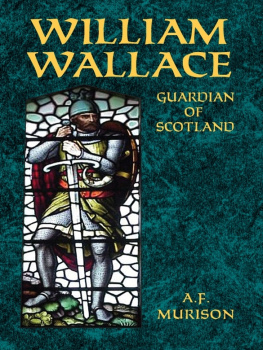

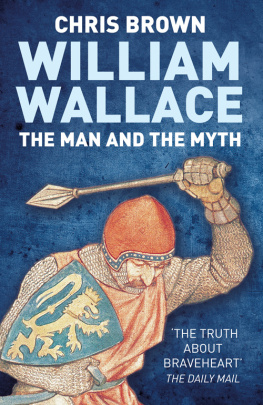
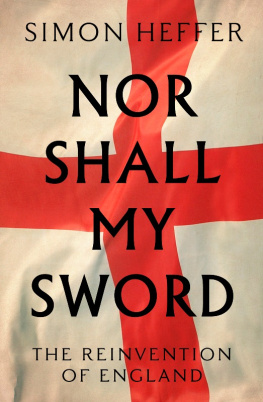
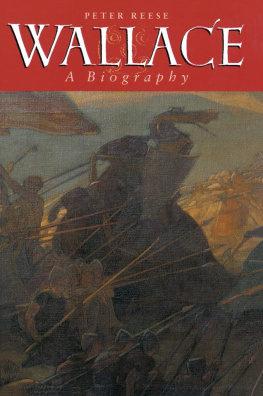
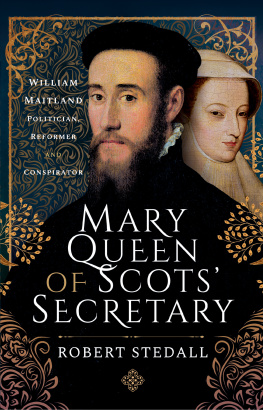
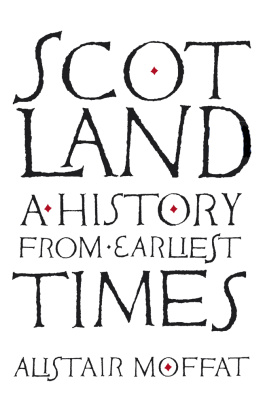
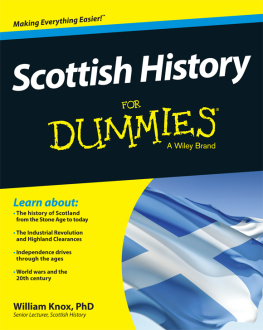
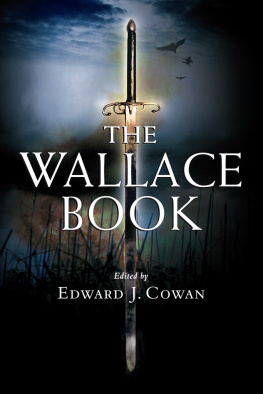
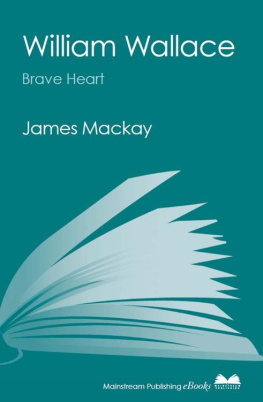
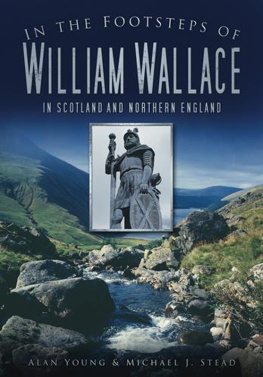
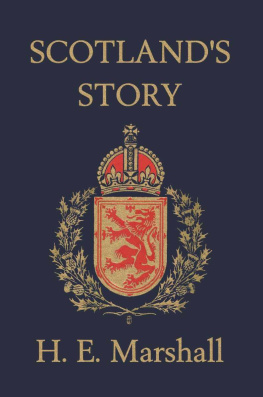

 e and l,
e and l,